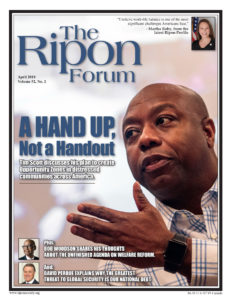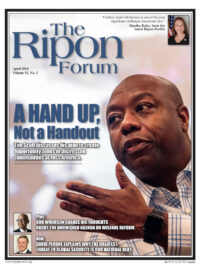 The passage of welfare reform in the summer of 1996 was a watershed moment in recent American political history.
The passage of welfare reform in the summer of 1996 was a watershed moment in recent American political history.
It represented a major shift in the federal approach to the war on poverty, in that it required able-bodied Americans to work as a condition of receiving benefits. Beyond that, it also represented one of the last times both parties came together over major reform legislation.
Twenty-two years later, the prospect of a compromise of this magnitude seems remote at best. The political environment is too poisonous, and the scars of unending partisan warfare are too fresh. And yet the need to update and make further reforms to the way Washington helps people climb the economic ladder could not be greater.
As Arthur Brooks pointed out in an essay earlier this year, “The government has spent $20 trillion since the mid-1960s trying to alleviate poverty by helping struggling people meet their material needs.” Despite this fact, he continued, 15% of the country was trapped in poverty in 2017 — the same number as 1964. “So while poverty has become more bearable,” Brooks concluded, “it has not become any more escapable. Is that really success?”
Among those who do not believe the current system is a success is Tim Scott. The Senator from South Carolina recently launched what he is calling an “Opportunity Tour” across his home state, in which he is talking about the need for new approaches in the war on poverty, and a proposal that he has championed which was signed into law as part of the Tax Cut and Jobs Act last fall.
The proposal is called Opportunity Zones. Scott explains what the Zones would do in our cover story for this latest edition of the Forum. “Instead of utilizing a ‘band-aid method’ or temporary fix,” the Senator writes, “this piece of legislation aims to lift up entire neighborhoods by attracting private investment to areas most in need.” In putting forward this plan, Scott also notes he was inspired in part by the work of the late Jack Kemp.
When then-Congressman Kemp wanted to learn more about the war against poverty in the mid-1980s, he contacted Bob Woodson. At the time, Woodson was a civil rights activist and the founder of the Center for Neighborhood Enterprise, which helped residents of low-income neighborhoods address the problems of their communities. He would go on to serve as an advisor to Kemp when he was HUD Secretary. More recently, he has advised Speaker Paul Ryan on federal efforts to fight poverty today.
Woodson writes about these efforts in this latest edition, and doesn’t pull any punches in this regard. “In addressing the plight of Americans trapped in intergenerational dependency,” the anti-poverty crusader writes, “neither side explores solutions that go beyond tinkering with the existing 80-plus anti-poverty programs in suggesting reforms of the current welfare system.” Woodson shares his thoughts on how both Republicans and Democrats can “go beyond tinkering” and bring real change to a system that has proven to be ineffectual over the years.
One state where real reforms are being made to the welfare system is Wisconsin, where the legislature recently approved a package of nine bills backed by Governor Scott Walker. Brett Healy, the President of the MacIver Institute in Madison, writes about this package in an essay, and discusses whether it could serve as an example to other states. Given the opioid crisis raging across the nation, it is difficult to talk about welfare in America without also talking about the youngest victims of the opioid crisis — namely, the children who have been taken away from their parents and are now in foster care. Dr. Nancy Young examines their plight — and the burden it is placing on our system — in an essay.
An unrelated but equally serious crisis is America’s exploding national debt. Former businessman and current Georgia Senator David Perdue examines the growth of the debt in an essay, and why he believes it represents the greatest threat to security around the globe. A more uplifting success story can be found in Oklahoma City, where unemployment is down and economic growth is up. Both may be related to a healthy lifestyle campaign launched by former Mayor Mick Cornett. Cornett discusses the campaign in an essay. In another essay, former Congressional aide and veteran political strategist John Feehery examines political dysfunction on Capitol Hill and puts forward “5 Ideas to Make Congress Work.”
In our latest debate feature, Samuel Hammond and Aaron Rent square off about the costs — and benefits — of providing Americans with a Universal Basic Income. And in our latest Ripon Profile, Alabama Congresswoman Martha Roby talks about her role as a working Mom and her responsibilities as a member of the Defense Appropriations Subcommittee.
As always, we hope you enjoy this edition of the Forum, and encourage you to contact us with any comments, questions or ideas you may have.
Lou Zickar, Editor
louzickar@clu.ccw.mybluehost.me




